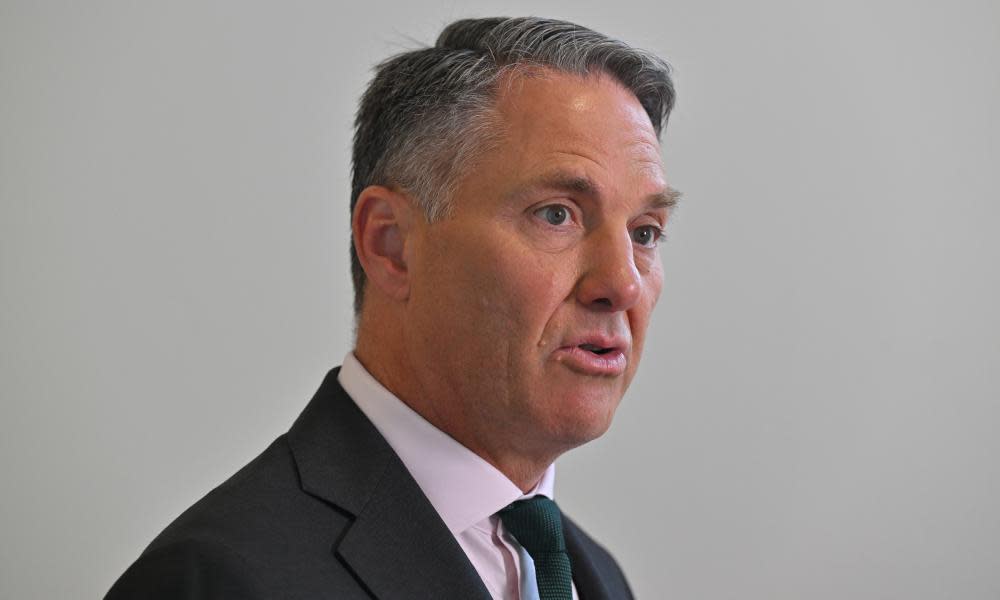Australia cannot be ‘passive bystanders’ in a war between US and China, Richard Marles says

A war between the United States and China over the future of Taiwan would be “so grave” that Australia cannot be “passive bystanders”, the defence minister has said.
Richard Marles pushed back at the idea advanced by some commentators – including the former Labor prime minister Paul Keating - that Taiwan is “not a vital Australian interest”.
Speaking during a visit to South Korea, Marles said Russia’s invasion of Ukraine was “a failure of deterrence” and “our job is to ensure we experience no equivalent failure in our region”.
“The most consequential risk we face is the resumption of great power conflict in our lifetime,” Marles said in an address to the Seoul Defence Dialogue on Wednesday evening.
“Nowhere will this be more important than on the issue of Taiwan.”
Marles emphasised that Australia had not changed its position on Taiwan – a self-governed democracy of 24 million people that Beijing claims as its own and has not ruled out taking by force.
“Australia does not take a position on the final status of Taiwan other than it must be arrived at peacefully, consistent with the will of peoples on both sides of the strait, and not though the use of force or coercion,” he said.
“But the consequences of US-China conflict over Taiwan are so grave that we cannot be passive bystanders.”
Marles’s comments are not a precommitment of Australian forces to a future war, but a call for Australia to work with its allies and partners to ensure such a conflict is prevented.
His predecessor as defence minister, Peter Dutton, was accused of straying from longstanding bipartisan policy when he said in November 2021 that it “would be inconceivable that we wouldn’t support the US in an action if the US chose to take that action”.
At the time, Chinese government officials called on Australian politicians to “refrain from doing anything that’s destructive to our relationship”. Beijing has repeatedly argued Australia and other countries should not interfere in “China’s internal affairs”.
The Albanese government has sought to “stabilise” the relationship with Australia’s largest trading partner. That has resulted in some progress, including Beijing’s decision to scrap tariffs on Australian barley and release the detained Australian journalist Cheng Lei.
Related:Aukus could weaken China deterrence,
But Labor has locked in support for the Aukus nuclear-powered submarine plan as part of US-led deterrence efforts, a strategy that has drawn criticism from Keating, who says Australia is reducing its room to move.
Marles said leaders “must work together to navigate this challenging new period with nuance and judgment, with statecraft that ensures that no country judges that the benefits of conflict might outweigh the consequences”.
Acknowledging limits to Australia’s influence as a middle power, Marles said it would “take a network of states acting together to shape our region’s strategic trajectory”.
Marles, who has previously accused China of a lack of transparency about its own rapid military modernisation, said Australia would “practice what we preach” by being open about its defence policies.
Marles also called for “an inclusive regional order in which trade and investment integration continues to expand – not shrink”.
“Russia’s decision to start a major war in Europe has killed off the theory that economic interdependence is an antidote to conflict, but we are still better off with it than without it,” he said.
Related: Visiting professor used PhD students to gather intelligence for China, Asio boss alleges
“The division of our region into not only rival geostrategic but also geoeconomic blocks will make our region poorer and more vulnerable to conflict.”
While describing “decoupling” between rival economic blocs as a “trap”, Marles said Australia must diversify its supply chains so that it was not vulnerable to “coercion”.
Marles said the “optimistic assumption” at the end of the cold war that ideological competition had ended “now looks more like wishful thinking”.
“We need to face the reality that the post-cold war era has come to an end. In its place is a new struggle among states as they compete to shape the structures of the new era to come.”


